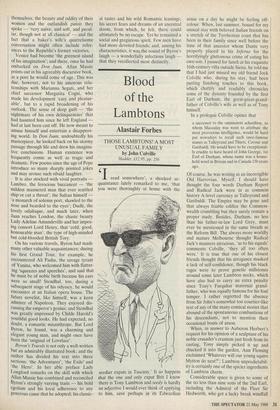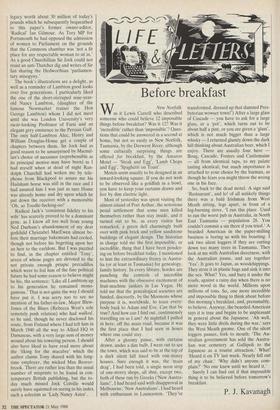Blood of the Lambtons
Alastair Forbes
THOSE LAMBTONS! A MOST UNUSUAL FAMILY by John Colville
Hodder, £12.95, pp. 256
Iread somewhere', a shocked ac- quaintance lately remarked to me, 'that you were thoroughly at home with the seedier expats in Tuscany.' It so happens that the one and only expat Brit I know there is Tony Lambton and seedy is hardly an adjective I would ever think of applying to him, save perhaps in its Edwardian sense on a day he might be feeling off- colour. When, last summer, bound for my annual stay with beloved Italian friends on a stretch of the Tyrrhenian coast that has been in their family since well before the time of that ancestor whom Dante very properly placed in his Inferno for the horrifyingly gluttonous crime of eating his own son, I paused for lunch at his exquisite 16th-century villa outside Siena, he told me that I had just missed my old friend Jock Colville who, during his stay, had been putting finishing touches to this book, which chattily and readably chronicles some of the dynasty founded by the first Earl of Durham, the great-great-grand- father of Colville's wife as well as of Tony himself.
In a prologue Colville opines that
a successor to the omniscient schoolboy, to whom Macaulay was wont to attribute the most precocious intelligence, would be hard put nowadays to recall such once-famous names as Talleyrand and Thiers, Cavour and Garibaldi. He would have to be exceptional- ly erudite to have heard of John George, 1st Earl of Durham, whose name was a house- hold word in Britain and in Canada 150 years ago.
Of course, he was writing as an incorrigible Old Harrovian. Myself, I should have thought the four words Durham Report and Radical Jack were in as common history A-level currency as Talleyrand and Garibaldi. The Empire may be gone and that always friable edifice the Common- wealth crumbling but they surely remain a proper study. Besides, Durham, no less than his father-in-law Lord Grey, must ever be mentioned in the same breath as the Reform Bill. The always more worldly and mature Melbourne thought Radical Jack's manners atrocious, 'as to his equals' comments Colville, 'they all too often were.' It is true that one of his closest friends thought that his arrogance masked a lack of self-confidence, though his black rages were to prove genetic millstones around some later Lambton necks, which have also had to carry an extra penalty since Tony's Farquhar maternal grand- father, who was equally famous for his foul temper. I rather regretted the absence from Sir John's somewhat too courtier-like text of any of the many comical stories that abound of the spontaneous combustions of his descendants, not to mention their occasional bouts of arson.
When, in answer to Auberon Herbert's request for his opinion of a sculpture of his noble crusader's cranium just fresh from its casting, Tony simply picked it up and chucked it into the garden, Ann Fleming exclaimed 'Whatever will our young squire Mytton do next?'; Lambton unpredictabil- ity is certainly one of the spicier ingredients of Lambton charm.
Considerable space is given to some of the no less than nine sons of the 2nd Earl, including the Admiral of the Fleet Sir Hedworth, who got a lucky break windfall legacy worth about 30 million of today's pounds which he subsequently bequeathed to this paper's former owner-editor, 'Radical' Ian Gilmour. As Tory MP for Portsmouth he had opposed the admission of women to Parliament on the grounds that the Commons chamber was 'not a fit place for any respectable woman to sit in.' As a good Churchillian Sir Jock could not resist an anti-Thatcher dig and writes of Sir Ian sharing the Hedworthian 'parliamen- tary misogyny.'
The book's illustrations are a delight, as well as a reminder of Lambton good looks over five generations. I particularly liked the one of the short-stirruped nine-year- old Nancy Lambton, (daughter of the famous Newmarket trainer the Hon George Lambton) whom I did not meet until she was London University's very racee-looking Professor of Farsi and an elegant grey eminence in the Persian Gulf. The only half-Lambton Alec, Henry and William Douglas-Home get a couple of chapters between them. Sir Jock had as good reason to be unsurprised by Macmil- lan's choice of successor (reprehensible as its principal motive may have been) as I had myself when at dead of night Ran- dolph Churchill had woken me by tele- phone from Blackpool to assure me his Hailsham horse was still in the race and I had assured him I was just as sure Home was already home and dry upon which he put down the receiver with a memorable 'Oh, so Toodle-fucking-oo!'
Radical Jack's 'consistent fidelity to his wife' has scarcely proved to be a dominant gene, as I know all too well from young Ned Durham's abandonment of my dear godchild Christabel MacEwen almost be- fore their marriage bakemeats had cooled, though not before his begetting upon her an heir to the earldom. But I was puzzled to find, in the chapter entitled 'Tony', seven of whose pages are devoted to the not private enough priapic peccadillos which were to foil him of the fine political future he had some reason to believe might be his, the sentence: 'Like all Lambtons up to his generation he remained mono- gamous.' That is not quite the way I should have put it. I was sorry too to see no mention of his father-in-law, Major Blew- Jones of the Blues (Rebecca West's sole remotely posh relation) who had walked, so he said, though he never disclosed his route, from Finland where I had left him in March 1940 all the way to Allied HQ in Damascus, with a very large sum of money wound about his towering person. I should also have liked to have read more about the 'liking for the macabre' which the author claims Tony shared with his long- time employer, the wicked Max Beaver- brook. There are rather less than the usual number of misprints to be found in con- temporary British publishing, but the to- day much missed Jock Colville would surely have squirmed on seeing in his index such a solecism as 'Lady Nancy Astor'.































































 Previous page
Previous page